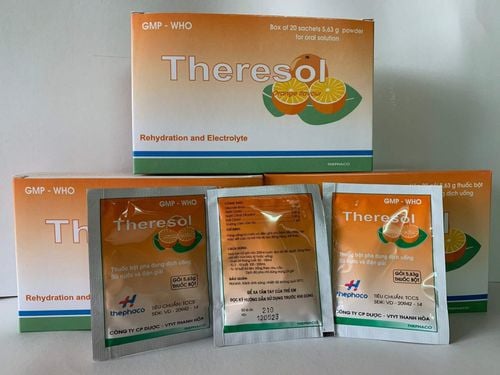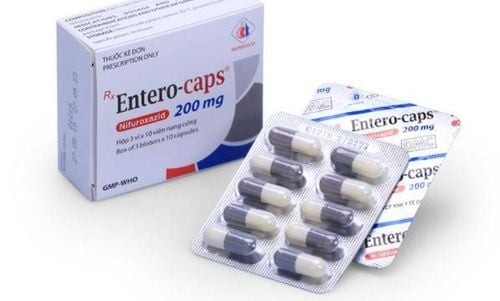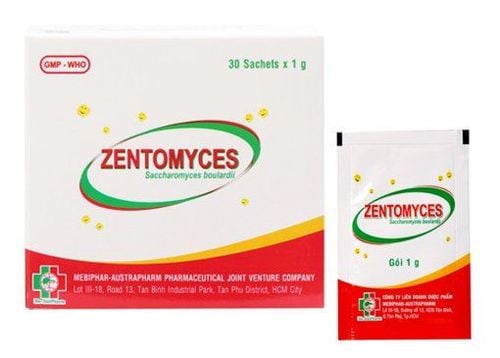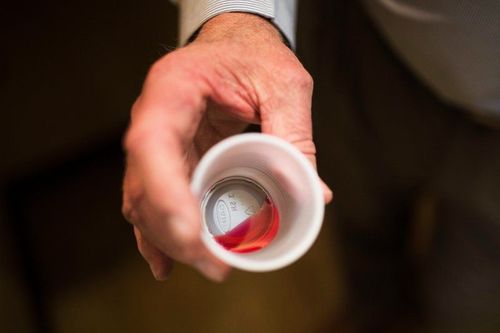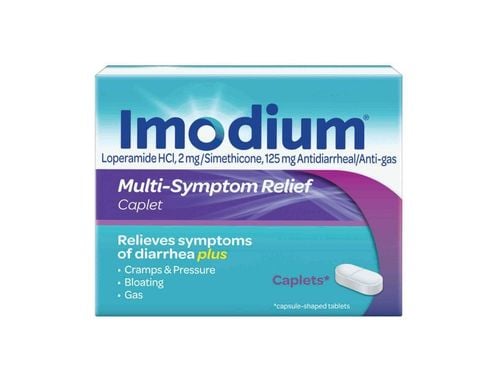This is an automatically translated article.
Racedagim 100mg is a line of drugs for the treatment of acute diarrhea in children with the main ingredient being Racecadotril. Let's find out more details about the uses, usage and notes when using Racedagim 100mg through the article below.
1. What is Racedagim 100?
What is Racedagim 100? Racedagim 100 belongs to the group of gastrointestinal drugs used to treat the symptoms of acute diarrhea in children.
Racedagim 100 is a product of Agimexpharm Pharmaceutical Joint Stock Company. The drug is prepared in the form of powdered nuggets and is packed in boxes of 10 packs x 1 gram of powdered medicine.
In each pack of Racedagim 100mg, the main ingredient is Racecadotril 10mg and other excipients such as: Apricot flavor powder, Aspartam, Kyron T112B, Xanthan gum, Magnesium stearate, White sugar, Purified water.
2. Indications for taking Racedagim 100 mg
Racedagim 100mg is used in the treatment of symptoms of acute diarrhea in adults and children when the cause cannot be treated.
In cases where the cause can be treated, Racedagim is used in support as prescribed by a doctor or pharmacist.
The drug has the main ingredient Racecadotril, which is an inhibitor of the enzyme enkephalinase, which helps the drug to limit the loss of water and electrolytes, and these are also two causes to overcome symptoms. acute diarrhea. However, the drug does not reduce intestinal motility, so after treatment will not cause constipation. Besides, if using Racedagim with Oresol together, it will quickly reduce and shorten the treatment time for acute diarrhea.
3. Dosage - how to take Racedagim 100 mg
How to use: Racedagim 100 should be swallowed whole in water or stirred into food, milk bottles. However, the patient needs to drink the medicine after it is finished.
Dosage:
Use Racedagim in combination with rehydration therapy.
Adults & Children > 15 years: initiate 1 100mg Racecadotril tablet at any time, then 1 100mg Racecadotril tablet every 8 hours until diarrhea stops. The total daily dose should not exceed 400mg of Racecadotril. If diarrhea persists for more than 7 days and shows no signs of improvement, the patient should consult a doctor. Children: Use as oral powder sachet 10mg Racecadotril & 30mg Racecadotril. The first day: take the starting dose, 1 dose of Racecadotril x 4 times/day. The following days: 3 doses/day, maximum use of Racecadotril for 7 days. 10mg & 30mg sachets: Children 1-9 months (under 9 kg): 1 pack of 10mg/dose Children 9-30 months (9-13kg): 2 packs of 10mg/dose Children 30 months - 9 years old (13-27) kg): 1 pack of 30mg/dose. Children over 9 years old (over 27kg): 2 packs of 30 mg/day. Note: Racedagim is not a substitute for conventional rehydration regimens. Therefore, it is best to use the drug in combination with the most reasonable rehydration regimen. In cases, the patient has severe diarrhea with vomiting and dehydration can be rehydrated by intravenous infusion.
4. Contraindications to treatment with Racedagim
Racedagim 100mg drug should not be used in the following cases:
Patients are allergic or sensitive to the active ingredient Racecadotril or any of the active ingredients in the drug. Patients with liver failure, kidney failure should not use Racecadotril. Racecadotril should not be used in patients with glucose or galactose malabsorption syndromes, in patients with fructose intolerance or with problems due to a deficiency of sucrase or isomaltase enzymes.
5. Be careful when using Racedagim 100mg
Before using Racedagim 100mg for treatment, patients need to carefully refer to the instructions for use of the drug or the prescription of the doctor or pharmacist who has prescribed it. In addition, patients can refer to some of the following notes when using Racecadotril.
Patients need to strictly follow the doctor's instructions on how to take Racecadotril, as well as how to rehydrate and the doctor's advice on the child's diet. Stop giving children milk products or milk must be consulted with a doctor, pharmacist. For children younger than 2 years old, if they experience diarrhea or an unusual increase in the number of bowel movements a day, they should consult a doctor immediately. In the case of diarrhea more than 6 times/day, or diarrhea lasting more than 24 hours, or diarrhea accompanied by weight loss, the doctor will consider prescribing a rehydration solution. Use with caution in patients with fever, vomiting, bloody stools or mucus. In fact, it is necessary to take into account the causes of diarrhea, so the child should drink all the rehydration solution prescribed by the doctor. If the baby is still breastfed, continue to breastfeed. In the case of patients with diabetes, it is necessary to take into account the amount of sugar in each packet (each pack of Racecadotril contains 0.873 g of sugar). If the amount of sugar (which is a source of fructose and glucose) in the daily dose exceeds 5g/day, the daily servings should be taken into account. If there is blood or pus in the stool along with a fever, it indicates that the cause of the diarrhea is an infection or some other serious illness. Racedagim has not been studied in patients with antibiotic-associated diarrhea, so it should not be used in this case. There are no adequate data on Racecadotril in patients with chronic diarrhea. Data are limited in patients with renal and hepatic impairment. Prolonged vomiting may compromise the bioavailability of Racecadotril. There have been reports of some cases of use of Racecadotril with some skin reactions. However, the majority are usually mild and do not require treatment, but some severe cases require immediate discontinuation of treatment with Racecadotril. Hypersensitivity reactions or angioedema have been reported in some patients receiving Racecadotril and may occur at any time during administration. Facial edema may appear on the face, lips, eyes and mucous membranes. In the case of angioedema associated with an obstruction of the upper airways such as the tongue and larynx or trachea, immediate medical attention is required. Racedagim contains lactose, so patients with hereditary problems of galactose intolerance, glucose galactose malabsorption or lapp lactase deficiency should not take the drug. There are insufficient data on the use of Racecadotril in pregnant women on the embryo, fetal development or childbirth. However, the use of Racecadotril in pregnant women is not recommended. Patients should consult their doctor before deciding to use Racedagim. There are insufficient data on whether the secretion of Racecadotril is present in human milk. Therefore, Racecadotril should not be used by nursing mothers.
6. Side effects when using Racedagim
During the use of Racedagim, patients may experience some unwanted side effects as follows:
Feelings of drowsiness, dizziness and headache Nausea/vomiting, constipation Rash, nodules on the skin, itching, urticaria, red spots,... Tonsillitis, tongue edema, lip edema, angioedema Patients experiencing any other abnormal symptoms not listed above should report it to doctor or pharmacist know to be treated promptly and have other more effective treatment options.
Racedagim 100mg is a line of drugs for the treatment of acute diarrhea in children with the main ingredient being Racecadotril. To ensure the effectiveness of treatment and avoid unwanted side effects, patients need to strictly follow the instructions of the doctor, professional pharmacist.
Follow Vinmec International General Hospital website to get more health, nutrition and beauty information to protect the health of yourself and your loved ones in your family.
Please dial HOTLINE for more information or register for an appointment HERE. Download MyVinmec app to make appointments faster and to manage your bookings easily.




